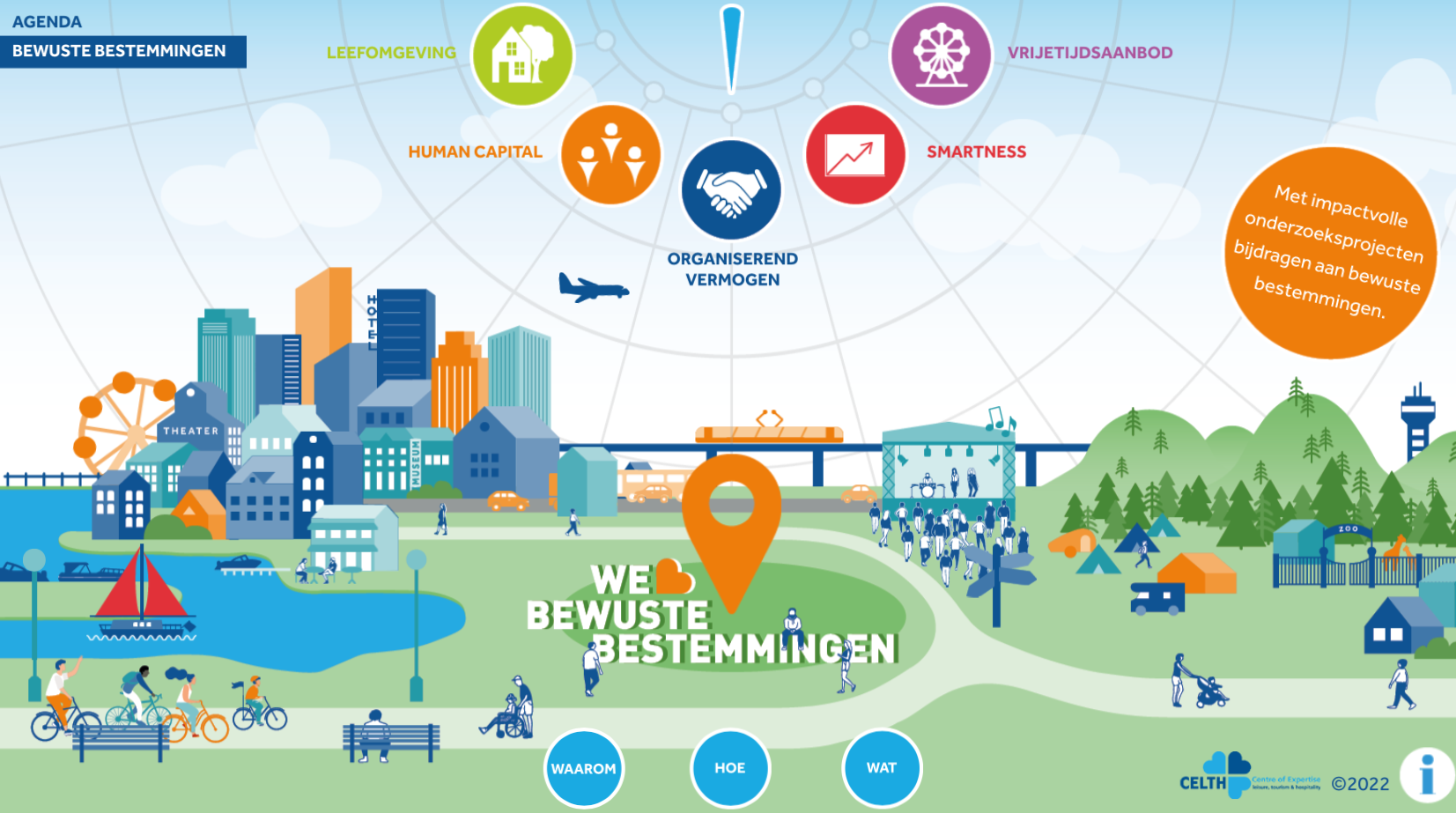Value and feeling behind the Agenda Conscious Destinations
In April, the Center of Expertise Leisure, Tourism & Hospitality (CELTH) presented its Agenda Conscious Destinations (ABB). CELTH will invest one and a half million euros in this multi-year knowledge agenda over the next three years. Knowledge on five urgent themes, quality of life, human capital, organizing capacity, smartness, and leisure activities is being developed around Conscious Destination.
According to CELTH, these themes currently have the highest priority given the situation in the hospitality domain. Within each of these themes, concrete core tasks and priorities for knowledge gaps are identified. Together with partners, CELTH wants to tackle these tasks with research and knowledge development.
After the dust had settled, the editors of the trade journal Recreation & Tourism surveyed the reactions of two involved parties and three external parties: Jeroen Klijs (BUas), Peter Bergmans (Sweco), Stefan Hartman (NHL Stenden | NHL Stende | ETFI), Joris Pieter Neuteboom (Province of North Holland) and Conrad van Tiggelen (NBTC).
Jeroen Klijs: Coherence
For Jeroen Klijs, Professor Tourism Impact on Society at Breda University of Applied Sciences, the relationship between the five themes is of great importance: “Take the question about indicators for broad prosperity. This has to do with the theme of living environment, but also with the theme of smartness. And if you then want to start working with it, you will have to deal with the theme of organising capacity.” In this way, according to Klijs, you work synergistically on urgent tasks.
Peter Bergmans: 3D
Peter Bergmans, Senior Advisor at Sweco finds the Agenda Conscious Destinations very clear but would have liked to add a sixth theme to it: “What I miss in the ABB is more focus on the area assignment and more focus on working from the DNA of the area.” Then the ABB changes in its view from a 2D to a 3D puzzle.
Stefan Hartman: Smarter
Program manager Stefan Hartman of the European Tourism Futures Institute may want policymakers to take a smarter look at how investments in, for example, landscape, nature, the nitrogen problem, waterways, and infrastructure will pay off for the leisure economy. “Tourism is part of area development, but it is often not yet addressed that way in policy.” According to Hartman, that is not good because it also fits in with the challenge of achieving broad prosperity.
Joris Pieter Neuteboom: Substantiate
Joris Pieter Neuteboom, Tourism & Recreation policy advisor at the province of Noord-Holland endorses the statement in the ABB that the time of growth, with more people staying longer at every destination, is over. “We have to move away from unbridled growth and towards thoughtful and smart growth.” According to him, CELTH has correctly estimated that you must also be able to substantiate the added social value of tourism with good substantiation. He would see more attention in the agenda for the leisure behavior of both visitors and residents.
Conrad van Tiggelen: Tomorrow
Conrad van Tiggelen, Director Strategy & Branding of the Netherlands Bureau for Tourism and Congresses (NBTC) sees that the ABB fits in completely with the Perspective 2030 that NBTC presented in 2018 and the advice on Valuable Tourism from the Rli. “The ABB helps by peeling back what the research questions are. Ideally, the elaboration of this agenda will be an interplay between research that partners need now and new research that explores future developments and addresses tomorrow's challenges.”
Read the entire article from Recreation & Tourism online (in Dutch) with all the interesting notions of the five discussion partners or download the article in PDF below.
Download article from R&T Magazine (in Dutch)
Focus on Core Web Vitals and user-centric performance metrics for better search rankings and user experience.
Download


